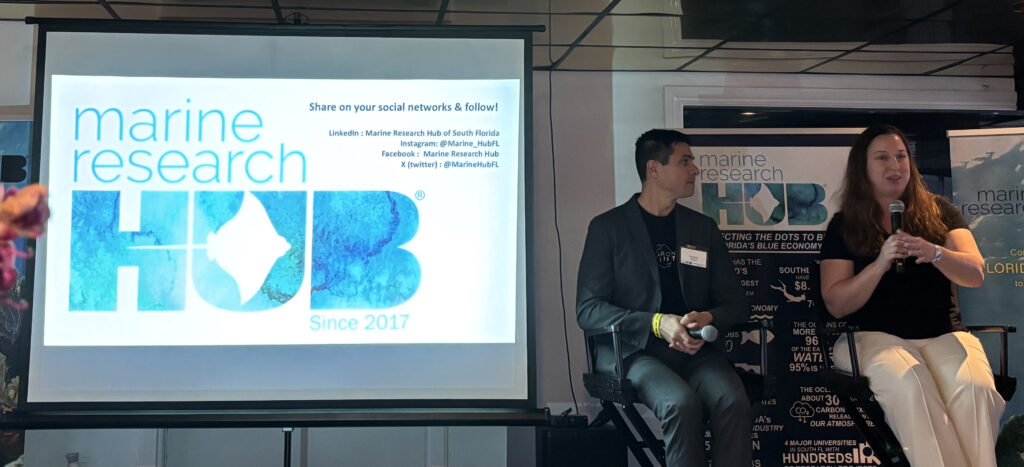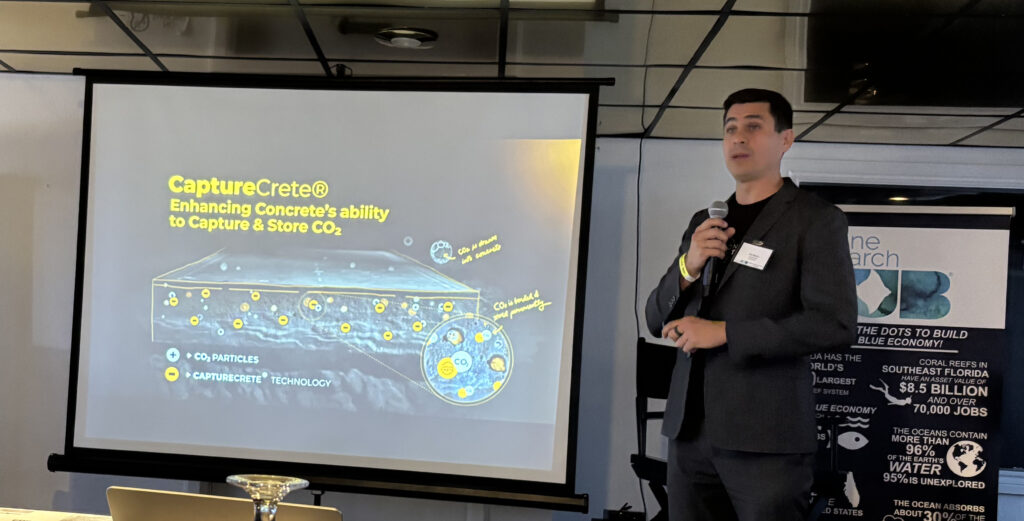By Laurie Mermet, The Invading Sea
Three Florida-based companies working to commercialize environmentally friendly products were featured at this year’s Marine Research Hub Summit.
The 8th annual event, held at the Fort Lauderdale International Boat Show, showcased companies developing microbe-based cosmetics, an eco-friendly boat coating and CO2-absorbing concrete.
The Marine Research Hub, established in 2017 by local business leaders, aims to transform promising oceanic research from universities into marketable solutions.
“We are trying to elevate nature-based solutions, research-based solutions for sustainable and innovative practices that are going to protect our environment and our communities,” said Katherine O’Fallon, the Marine Research Hub’s executive director. “… The research is not going to do us any good if it just stays on the shelf.”
One of the featured presenters, Jessica Tittl Nielsen, CEO and co-founder of Cordelia Biosciences, explained how her company is working to reduce the cosmetics industry’s reliance on fossil fuel-based ingredients.

“Imagine a world where the ingredients in your moisturizer didn’t kill our coral reefs,” Nielsen said, adding that the vast majority of the chemicals in daily-used products are made with fossil fuels.
Cordelia Biosciences uses ocean microbes from coral reefs to make sustainable ingredients that can replace harmful chemicals in everyday products. The company also uses microbes to produce pigments, including a natural red dye they call “The Red Sea.”
“Chemicals doesn’t have to be a dirty word,” Nielsen said.
She said the company has tested these microbe-derived ingredients in liquid soaps, with promising results in reducing bacterial and fungal growth, proving them to be a viable preservative option for the beauty industry.
“We create ingredients from nature, for nature,” Nielsen said.
The second presenter at the event was Benny Pearman, founder of SynMatter, which is developing a sustainable alternative to traditional steel coatings commonly used on boats. The technology projects against corrosion using “smart particles,” he said.
“The materials we’re using nowadays just aren’t good enough … and so you have to do constant maintenance,” Pearman said. “Pretty regularly, every three to five years … it could be 30% to 40% of the whole ship (that) needs to be repainted.”
Pearman explained that their technology, a non-toxic powder additive mixed into paint, provides enhanced corrosion protection without harmful heavy metals or marine pollutants. He said that by doubling the lifespan of coating on ships, SynMatter’s solution promises a significant reduction in maintenance costs and environmental impact.
“Corrosion is one of the world’s biggest problems – that’s not an exaggeration,” Pearman said. “It’s estimated that the world economy spends $3.4 trillion every single year dealing with the direct effects of corrosion, about twice that with the indirect effects.”
The third company, Carbon Limit, provides concrete companies with a powder additive that transforms concrete into a carbon-absorbing material. Tim Sperry, CEO and founder of Carbon Limit, introduced “CaptureCrete” at the event – a technology that uses a product that NASA has also used – to convert CO2 from the atmosphere and permanently store it within the concrete.

“We’ve created this technology with a special catalyst that when you put into a roadway, it turns it into an active magnet for CO2 from the air,” Sperry said, adding that the company chose concrete because it’s the second-most used material on the planet.
Sperry also showed “CoolCrete,” a cooling concrete additive that reflects sunlight and reduces urban heat. The additive cuts the carbon footprint at manufacturing by up to 30% by replacing about 40% of the cement, he said.
He said that the company has been collaborating with tech companies on pilot projects and noted that applying CoolCrete to building exteriors, sidewalks, streets or rooftops can reduce heat transfer into facilities, lowering electricity use by up to 30%
“The ocean absorbs about 30% of our CO2 pollution. We need something else to do the rest,” Sperry said.
The Marine Research Hub received over 130 applications this year from around the world. Each applicant goes through a review process, which O’Fallon is a part of, until the pool is narrowed to 15 finalists.
Based in South Florida, The Marine Research Hub’s goal is to highlight the work of ocean research organizations and help turn their discoveries into products and services.
“That’s what we need to be known for … Florida is going to be leading the way with solutions in building the blue economy,” O’Fallon said.
Laurie Mermet is a Florida Atlantic University senior majoring in multimedia journalism who is reporting for The Invading Sea during the fall 2024 semester. Banner photo: An aerial view of the Fort Lauderdale International Boat Show in 2021 (iStock image). Editor’s note: This article has been corrected to clarify information about Carbon Limit’s products.
Sign up for The Invading Sea newsletter by visiting here. If you are interested in submitting an opinion piece to The Invading Sea, email Editor Nathan Crabbe at nc*****@*au.edu. To learn more about the blue economy, watch the video below.



